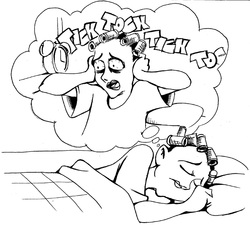
In spite of the fact that we spend around a third of our lives asleep, sleep is something that we often take for granted until we are unable to do it. The amount of sleep each individual needs varies throughout their life. Babies and young children need a lot more sleep than older adults.
Many people find that by the time they reach their 60's or 70's, the amount of sleep they need has dropped by up to several hours a day. The average time we sleep is often said to be about eight hours but this is only true for some people. There is a wide normal healthy sleep range. Some people sleep only four to six hours a day whereas others can sleep for as many as 10 or 12 hours a day. Both extremes are quite normal.
Why do we need sleep?
Sleep is so essential for your physical and mental well-being that you spend around a third of your life in bed! Sleep is a necessary part of life, however studies have shown that most people do not need very much sleep at all to be physically and mentally healthy. In Sleep research laboratories, it has been found that many people who suffer from insomnia actually sleep far more than they think.
Sometimes people who are actually sleeping and are in a light level of sleep can actually be dreaming that they are awake. This information may help allay fears that you are not sleeping at all. It is also important to know that sleep deprivation does not have catastrophic impacts on the brain or body. It is possible to function effectively with very little sleep each night.
What is insomnia and sleep disturbance?
Insomnia, or inability to sleep, is something that many people notice from time to time. Insomnia may start after an isolated incident or an upsetting life event, or it can be related to a feature of a person’s lifestyle. Various factors in your current life can worsen sleep and cause insomnia.
Sleep disturbance is the perception of difficulty falling asleep, or in maintaining an adequate amount of sleep. You may wake up earlier than you would like, and the sleep you do achieve is not refreshing.
At times, sleep can be disrupted for a variety of different reasons – often this occurs when you’re feeling worried or stressed. Worrying or panicking about the consequences of not sleeping is also very common. One of the most common fears that i come across either in my Fear 2 Freedom workshop or when coaching clients are that the person’s performance at home or at work will plummet.
Sometimes the person fears that they will become irritable and unable to cope. Sometimes they worry that either their brain or their body will be harmed by a lack of sleep. It may last just a few days (eg jetlag) or a few weeks (eg exam stress, redundancy, break up of relationship, grief, etc) but when it is due to anxiety, sleep difficulties can last for several weeks.




 RSS Feed
RSS Feed



























